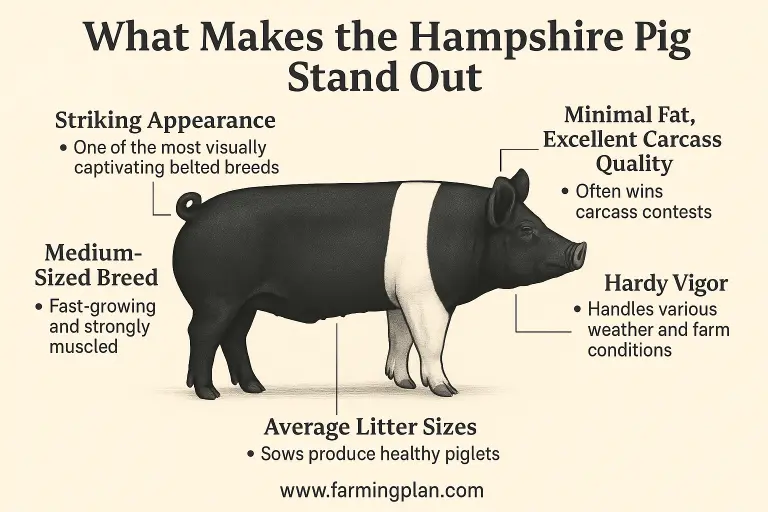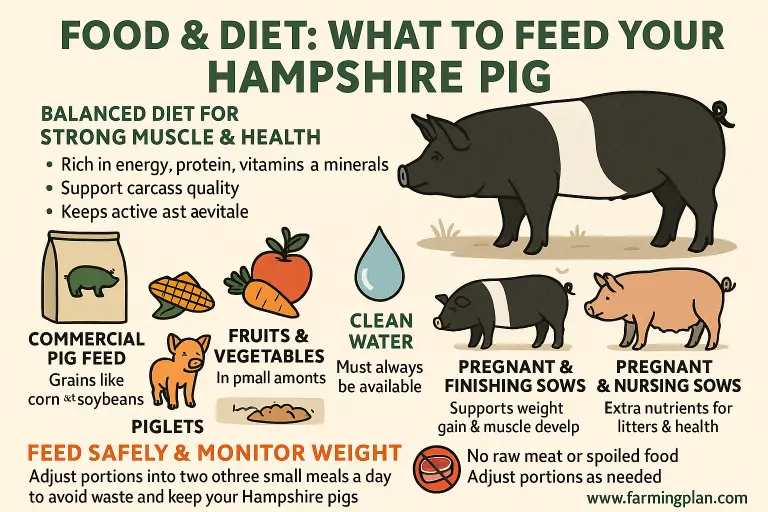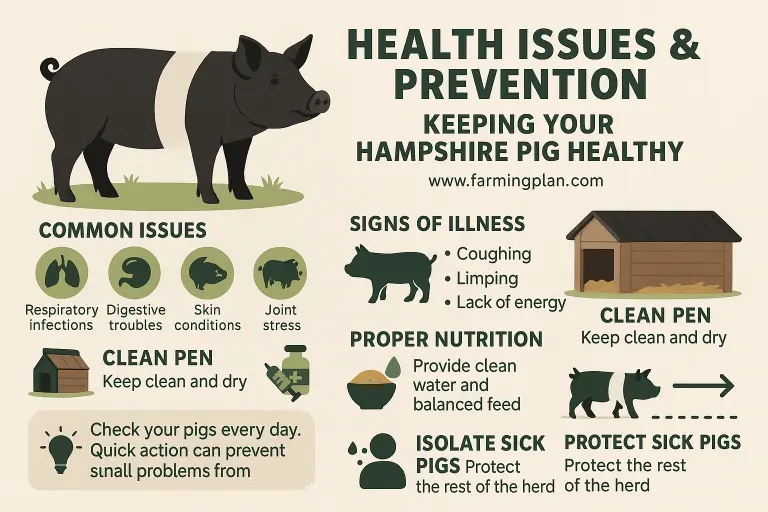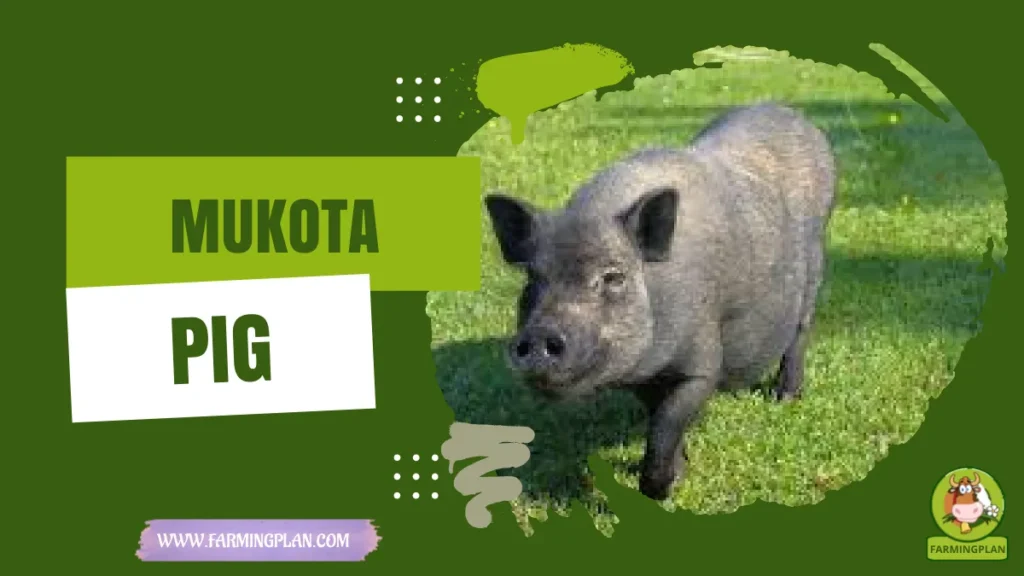The Hampshire Pig is one of the oldest and most popular breeds of hogs in existence today. Known for its bold black body and signature white belt, this breed stands out in both appearance and performance. Farmers, breeders, and pork lovers appreciate the Hampshire for its lean muscle, hardy vigor, and outstanding carcass qualities. With roots tracing back to Hampshire County in England, this medium-sized breed of pig has become a favorite in commercial farming and show competitions across the world. Whether you’re a first-time pig owner or a seasoned hog farmer, the Hampshire Pig offers a winning mix of strength, style, and smart farming value.

History & Origin
The Hampshire Pig’s story begins in Hampshire County, England, where British breeders developed this early American breed by selecting pigs with strong builds and good meat quality. These pigs were later brought to the United States in the early 1800s, where they quickly gained attention for their black body and white belt—features that still define Hampshire today.
American farmers improved the breed over time, focusing on traits like lean muscle and hardy vigor. One famous ancestor, the McGee hog, helped shape what is now considered modern Hampshire. The breed grew so popular that in 1907, the American Hampshire Swine Record Association was formed. This group, now known as the Hampshire Swine Registry, helps keep track of bloodlines, herd records, and breed standards. Thanks to its solid performance and consistent quality, the Hampshire became a top choice in farming communities. Today, it stands as one of the most trusted American breeds of hogs.
Reads More: King Pigeon: The Gentle Giant Every Bird Lover Adores
Characteristics
The Hampshire Pig is a sight to behold. Its striking black body adorned with a clear white belt that wraps around its front legs and shoulders makes it one of the most visually captivating belted breeds of pigs. Hampshires are a medium-sized breed, but they grow fast and develop strong muscles.

Their skeletal muscles are firm and packed with lean meat, making them valuable in meat production. The cylindrical muscle fibres and balanced muscle cell cytoplasm support efficient conversion of muscle to meat, which is a key trait for farmers aiming for premium price pork. This breed also has a deep body, upright ears, and solid legs.
It shows strong hardy vigor, meaning it can handle different weather and farm conditions well. With minimal amounts of fat and excellent carcass quality, it often wins in the majority of carcass competitions and interbreed championships. On average, Hampshire sows produce average litter sizes with healthy piglets. Their strong genetics and proven bloodlines make them a top pick for anyone raising pigs for meat or show.
Nature & Temperament
The Hampshire Pig is not just strong—it’s adaptable and easy to handle. Known for its calm, alert, and friendly nature, this breed thrives in various farm sizes and stays social with both pigs and people, providing a sense of reassurance to farmers of all levels. They are often described as confident but not aggressive. Farmers like their even behavior, especially when working with large groups. Their predictable actions make daily care easier and safer. Because of this, Hampshire is a great choice for beginner pig farmers and 4-H youth programs.
These pigs also do well in herds, staying peaceful as long as they have enough space and food. Their good temperament helps reduce stress, which also improves individual muscle fiber development and overall carcass quality. With their calm nature and reliable behavior, Hampshire pigs fit well into all types of pig farming—from backyard setups to commercial operations, ensuring that all farmers, regardless of their scale, can benefit from this breed.
Food & Diet
Feeding a Hampshire Pig the right way helps it grow strong muscles and stay healthy. This breed needs a balanced diet full of energy, protein, vitamins, and minerals. A proper feeding plan also supports their excellent carcass quality and keeps them active and alert. Start with commercial pig feed, which includes grains like corn and soybeans. These help build lean muscle. You can also add small amounts of fruits and veggies, but avoid giving them salty, sugary, or moldy food. Clean water must always be available—Hampshires drink a lot, especially in hot weather.

For piglets, start with special starter feeds high in protein. As they grow, they move to grower and finisher feeds that support their weight gain and muscle development. Pregnant sows and nursing moms need extra nutrients to care for their litters and stay healthy. Never feed pigs raw meat, spoiled food, or anything non-edible. Stick to safe, clean feed and monitor their weight to adjust their portions as needed.
Tip: “Split feeding into two or three small meals a day to avoid waste and keep your Hampshire pigs on a steady growth track.”
Usage & Purpose
The Hampshire Pig is one of the best choices for meat production. Farmers across the world raise this lean meat breed because it produces high-quality pork with excellent carcass quality. Thanks to their muscle content, Hampshire pigs grow fast and convert feed into muscle better than many other numerous pig breeds. Most Hampshires are raised for commercial meat markets, but they also shine in show rings and competitions. Their firm bodies, strong legs, and desirable traits make them top winners in many interbreed championships.
Some small farmers and hobbyists raise Hampshire pigs for personal pork supply. Others breed them to improve their herds through embryo transfer or careful selection of bloodlines. The Hampshire Swine Registry helps track and promote top-quality breeders. Even schools and youth farm programs use them to teach kids about farming. Their calm behavior and clear markings make them easy to handle and care for. In short, whether you farm for business, learning, or family food, the Hampshire Pig is a strong and smart choice.
Special Features
The Hampshire Pig has many traits that set it apart from other breeds of pig. Its most famous feature is the bold white belt circling its shoulders on a black body. This look is not just stylish—it also helps judges and farmers spot top-quality pigs quickly in shows and auctions.
Hampshires are known for their lean muscle, strong skeletal muscles, and minimal amounts of fat. These pigs grow fast and turn feed into meat efficiently, making them perfect for both manufacturing markets and local pork sellers. They also stand out for their hardy vigor. This means they can handle changes in weather, farm setups, and daily routines without stress. That makes them easier to raise and less likely to get sick.
Another bonus? Their genetics. With careful herd book recording and support from the Hampshire Swine Registry, breeders can pick from strong bloodlines for better health and meat quality. Many farmers say that Hampshire pigs offer some of the best carcass qualities of all American breeds—which is why they’re often used in random sample testing programs to measure performance.
Reads More: Havana Rabbits: The Perfect Family Pet with Charm and Grace
Health Issues & Prevention: Keeping Your Hampshire Pig Healthy
The Hampshire Pig is known for its strong body and hardy vigor, but like all animals, it can face health problems. Keeping them healthy means knowing what to watch for and how to prevent issues early. Some common problems in pigs include respiratory infections, digestive troubles, and skin conditions. Hampshires may also suffer from joint stress due to their fast growth and muscle development.
Watch for signs like coughing, limping, or a lack of energy. It’s important to keep their pen clean and dry. Dirty spaces attract germs and pests, which can lead to infections. Make sure your pigs get proper vaccinations and deworming based on your vet’s schedule.

Feed plays a big role, too. A poor diet can affect their normal body temperature, immune strength, and conversion of muscle to meat. Give them clean water and balanced feed to support strong muscle tissue and steady growth. Also, isolate any sick pig to protect the rest of the herd. Work with a vet you trust and keep good records of treatments and progress. That way, your Hampshire Pigs stay strong, happy, and ready for market or show.
Tip: “Check your pigs every day. Quick action can prevent small problems from turning into big ones.”
Step-by-Step Farming Guide: How to Care for Hampshire Pigs
Raising Hampshire Pigs requires careful planning and consistent care. Whether you’re a beginner or an experienced farmer, these steps will help you provide the best care for your pigs and ensure they grow strong and healthy.
Set Up a Comfortable Living Space
Create a clean, dry, and well-ventilated area for your Hampshire pigs. They need enough room to move around and rest. Make sure their pen is secure to prevent escape or injury. Use bedding like straw to keep the area dry and reduce the risk of infections.
Provide Proper Nutrition
Feed your pigs a balanced diet. Start with commercial pig feed rich in grains like corn and soybeans. As your pigs grow, ensure their diet supports lean muscle development and healthy growth. Don’t forget to supply clean water at all times.
Regular Health Checks
Monitor your Hampshire pigs for any signs of illness. Check their ears, eyes, and skin for signs of infection or injury. Watch for abnormal behavior like limping or coughing. Early detection of health issues will help prevent bigger problems.
Vaccinations and Worming
Consult with your vet for a vaccination schedule to keep your pigs protected from common diseases. Regular worming is also important to prevent parasites. Keep track of these treatments in a health record.
Handling and Socialization
Hampshire pigs are generally calm and social, but it’s important to handle them gently. Regular interaction helps them stay comfortable around people. Avoid sudden movements or loud noises that could stress them out.
Monitor Growth and Weight
Keep an eye on their weight and growth. Hampshires are known for growing quickly and developing strong muscles. Make sure they’re gaining weight at a steady rate, but avoid overfeeding, which can lead to unnecessary fat buildup.
Prepare for Breeding
If you plan to breed your Hampshire pigs, make sure to keep good records of bloodlines and breeding practices. Use quality boars and sows to maintain strong genetics. The Hampshire Swine Registry can be a helpful resource for tracking performance and bloodlines.
“Raising Hampshire Pigs Is More Than A Farm Venture—It’s A Journey To Building Stronger, Leaner, And Healthier Livestock.”
Expert Tips & Best Practices: Raising Hampshire Pigs Like a Pro
Raising Hampshire Pigs is a rewarding experience, but it requires attention to detail. Here are some expert tips and best practices to help you maximize the health and productivity of your pigs:
Focus on Genetics
When selecting pigs for breeding, prioritize strong bloodlines. Using pigs from reputable sources, like those registered with the Hampshire Swine Registry, ensures better health and carcass quality in the next generation.
Balance Their Diet
Feed your Hampshire pigs a consistent, balanced diet. As they grow, they adjust their feed to meet their changing nutritional needs. For best results, work with a nutritionist or use a quality feed designed for lean meat breeds. Proper nutrition supports skeletal muscles and helps convert muscle to meat more efficiently.
Keep Stress to a Minimum
Stress can impact the growth and health of your pigs. Hampshire pigs are naturally calm, but handling them gently and minimizing disruptions in their environment is key. Avoid overcrowding in the pen and ensure they have enough space to move around.
Maintain Clean Facilities
A clean environment reduces the risk of diseases and parasites. Regularly clean the pens, change bedding, and ensure proper waste management. This helps keep your pigs comfortable and healthy, especially in colder or wet weather.
Track Health and Growth
Keep detailed records of each pig’s growth, diet, and any health treatments. Monitoring their development helps you identify any issues early and ensure they’re meeting their growth targets. For Hampshire Pigs, tracking average litter sizes and carcass qualities can also help identify areas for improvement.
Breeding Best Practices
If you plan to breed your Hampshire pigs, choose boars and sows with the best characteristics, such as good muscle tone, size, and temperament. Utilizing embryo transfer technology can help improve your herd’s overall genetic strength.
Prepare for Market or Show
Whether you’re selling pork or showing your pigs, preparation is key. For market pigs, focus on the conversion of muscle to meat to ensure they yield high-quality pork. For show pigs, focus on appearance, muscle development, and temperament.
Where to Buy: Finding Quality Hampshire Pigs
If you’re ready to raise Hampshire Pigs, finding a reputable source is essential. Here’s where you can look for top-quality pigs, whether you’re a hobbyist, farmer, or breeder.
Hampshire Swine Registry
The Hampshire Swine Registry is a great place to start your search. It lists breeders who are committed to maintaining strong bloodlines and following breed standards. This ensures you’re getting healthy pigs with excellent carcass quality and the desired traits.
Local Livestock Auctions
Livestock auctions often have Hampshire pigs available for sale. Auctions are a good place to find pigs from multiple breeders, so you can compare prices, quality, and bloodlines. However, make sure to ask about their health records and vaccination status before making a purchase.
Reputable Breeders and Farms
Search for local breeders or farms specializing in Hampshire Pigs. Many breeders offer embryo transfer options and can help you choose the right pigs based on your farming goals. Look for breeders who provide herd book recordings and keep detailed health and growth records.
Online Platforms
There are several online platforms where you can buy Hampshire pigs, including websites like Craigslist, Pig Auctions, and specialized farm marketplaces. When buying online, ensure that the seller is trustworthy and provides clear health and breeding information.
Farm Supply Stores and Co-ops
Some farm supply stores or agricultural co-ops may also connect you with local breeders. These resources are helpful for getting recommendations and finding pigs that meet your specific needs.
4-H and FFA Programs
If you’re looking for Hampshire pigs for educational purposes, check out local 4-H and FFA programs. These organizations often have connections with breeders who provide pigs to youth programs and offer guidance on raising pigs. Before purchasing, always ask for health records, breeding information, and the pig’s age. This helps ensure you’re buying from a reputable source and setting yourself up for success.
FAQs
What is the origin of the Hampshire Pig?
The Hampshire Pig originated in the United States from pigs imported from Hampshire County, England, around 1825. These pigs were known for their lean meat and were initially called the “Thin Rind” breed. In 1890, American breeders renamed them the Hampshire breed, establishing a breed society and herd book recording system.
What are the key characteristics of the Hampshire Pig?
Hampshire pigs are black with a white belt encircling their shoulders and front legs. They have erect ears and a long, deep body. Known for their rapid growth and lean meat, they are highly valued for their carcass quality and efficient feed conversion.
Are Hampshire Pigs prone to health issues?
Like all breeds, Hampshire pigs can experience health problems such as respiratory infections, digestive issues, and skin conditions. Maintaining a clean environment, providing proper nutrition, and regular veterinary care can help prevent these issues.
What is the temperament of Hampshire Pigs?
Hampshire pigs are generally calm and easy to handle, making them suitable for both commercial farming and small-scale operations. Their robust nature allows them to adapt well to various farming conditions.
Where can I buy Hampshire Pigs?
Hampshire pigs can be purchased through reputable breeders, livestock auctions, and agricultural shows. The Hampshire Swine Registry provides a directory of registered breeders. It’s important to ensure that the pigs are from healthy stock and have proper documentation.
Conclusion
The Hampshire Pig is a distinguished breed known for its striking black coat with a white belt, erect ears, and robust build. Originating from England and refined in the United States, this breed excels in producing lean meat with excellent carcass quality. Hampshires are valued for their rapid growth, efficient feed conversion, and calm temperament, making them ideal for both commercial and small-scale farming. With proper care, including a balanced diet, a clean environment, and regular health monitoring, Hampshire pigs can thrive and contribute significantly to pork production.


